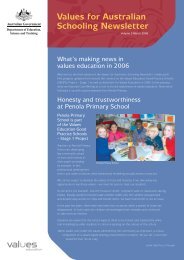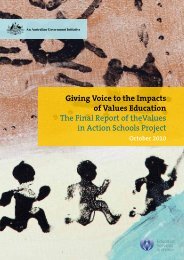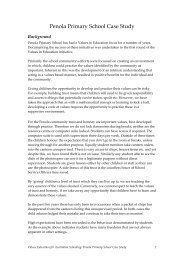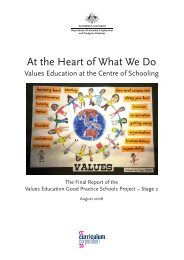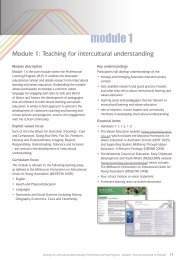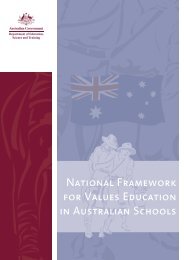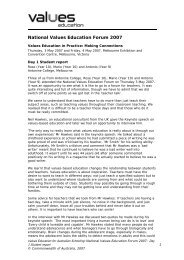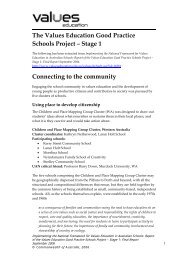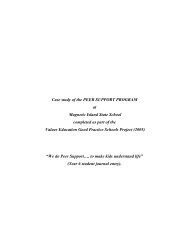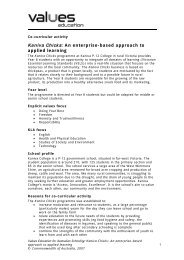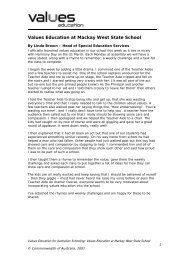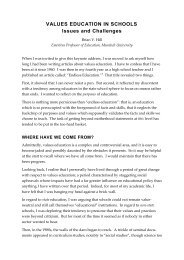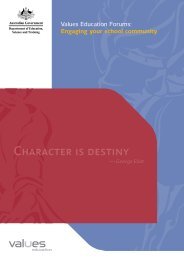Values for Australian Schooling Newsletter Vol.2 - Values Education
Values for Australian Schooling Newsletter Vol.2 - Values Education
Values for Australian Schooling Newsletter Vol.2 - Values Education
Create successful ePaper yourself
Turn your PDF publications into a flip-book with our unique Google optimized e-Paper software.
<strong>Values</strong> <strong>for</strong> <strong>Australian</strong><br />
<strong>Schooling</strong> <strong>Newsletter</strong><br />
Volume 2 November 2005<br />
What’s making news in values education<br />
Welcome to the second edition of the <strong>Values</strong> <strong>for</strong> <strong>Australian</strong> <strong>Schooling</strong> <strong>Newsletter</strong>. Inside you’ll<br />
find progress updates from around the country on the <strong>Values</strong> <strong>Education</strong> Good Practice Schools<br />
(VEGPS) Project – Stage 1. We hope the special feature on Case Writing is an incentive to<br />
record your own experiences in teaching values education.<br />
Case Writing encourages teachers to tell<br />
stories out of school<br />
Case Writing is a technique developed<br />
to assist teachers to reflect on their<br />
teaching by describing their practice so<br />
it can be discussed with colleagues.<br />
Case Writing is being used in a number<br />
of the VEGPS project schools as a way of<br />
capturing evidence of changed practice<br />
and as a way of fostering professional<br />
learning in values education and quality<br />
teaching.<br />
Albany Primary School.<br />
Cases are richly detailed narratives used<br />
to guide personal reflection on teaching<br />
values as well as providing a focus <strong>for</strong> discussing professional practice in values education.<br />
Although they are ‘story-like’, cases are not simply stories that teachers tell about their work.<br />
They are crafted into compelling narratives, with a beginning, middle and ending, situated in a<br />
specific timeframe.<br />
They have a plot that is problem-focused with some dramatic tension that must be relieved.<br />
They are embedded with many ‘problems’ that can be framed and analysed from various<br />
perspectives. They should include the thoughts and feelings of the teacher-writers.<br />
They all include reflective comments and question what could be done differently in similar<br />
situations. These comments include the author’s answer to the question: ‘What is this a case of?’<br />
The specific challenges, solutions, and experiences of a single case should be related to general<br />
issues and principles of learning and teaching.<br />
Each case is discussed with a colleague or critical friend, or in conference with a specialist<br />
university colleague working with the VEGPS clusters of schools.<br />
In effect, the conference collectively articulates best practice in simple terms. Often cases stand<br />
alone as highly practical illustrations of quality values teaching and evidence of progress. Learn<br />
more at http://www.valueseducation.edu.au.<br />
Acknowledgements: This draws heavily on the work of Lee Schulman, President of the Carnegie<br />
Foundation <strong>for</strong> the Advancement of Teaching, and his colleagues. It also draws on the work of<br />
the PEEL Project at Monash University and in particular the work of Ian and Judie Mitchell.
Snapshots from around the country<br />
The 26 VEGPS Project – Stage 1 school<br />
clusters have been teleconferencing<br />
and posting questions, photos and<br />
news on Weblogs set up to encourage<br />
communication. Clusters continue to<br />
work closely with their UAN critical<br />
friends at the crucial mid-point of the<br />
programme as they gather evidence of<br />
their good practices.<br />
Let’s see how two clusters are getting on.<br />
Queensland<br />
Philosophy in the Classroom<br />
Students and teachers in the Gold<br />
Coast North cluster are enthusiastically<br />
exploring philosophical and ethical<br />
approaches within the National<br />
Framework <strong>for</strong> <strong>Values</strong> <strong>Education</strong>.<br />
Gayle Alessio, Cluster Coordinator at<br />
Oxen<strong>for</strong>d State School, reports:<br />
Philosophy sessions are focusing on<br />
creating a ‘Community of Inquiry’ where<br />
children examine life’s ‘big’ questions<br />
in class discussion and small group<br />
activity. Teachers from P–7 are using<br />
children’s literature to stimulate curiosity<br />
and encourage deeper thinking about<br />
concepts such as right and wrong,<br />
friendship, bullying, fairness, rights and<br />
responsibilities. Some book titles that<br />
have been used in the Junior School<br />
are John Brown, Rose and the Midnight<br />
Cat, The Bunyip of Berkley’s Creek, Best<br />
Friends <strong>for</strong> Francis, Where the Wild Things<br />
Are, Aesop’s Fables and The Rainbow<br />
Fish. Teachers report that students are<br />
clearly thinking <strong>for</strong> themselves, accepting<br />
responsibility <strong>for</strong> their views and showing<br />
respect <strong>for</strong> the ideas of others.<br />
Many students have found that what they<br />
thought was obvious is not obvious to<br />
people with different perspectives. This in<br />
turn encourages tolerance and increases<br />
cooperation in working through issues.<br />
Philosophy in the Classroom enables our<br />
school communities to hold purposeful<br />
discussions around values – this will<br />
ultimately help our students understand<br />
and apply the nine <strong>Values</strong> <strong>for</strong> <strong>Australian</strong><br />
<strong>Schooling</strong>.<br />
Philosophy in the Classroom Cluster:<br />
Oxen<strong>for</strong>d State School, Bellevue Park<br />
State School, Upper Coomera State<br />
College and Southport State High School<br />
New South Wales<br />
Catholic secondary students<br />
explore values in key learning<br />
areas<br />
The Sense of the Sacred project is<br />
examining the integration of values<br />
education with the curriculum.<br />
Jenny Rickard, Cluster Coordinator<br />
of the Sense of the Sacred Cluster,<br />
reports:<br />
Quality practitioners from the five<br />
Catholic secondary schools in this cluster<br />
are using the <strong>Values</strong> <strong>Education</strong> Good<br />
Practice Schools Project to provide:<br />
• clearly articulated values within each<br />
KLA;<br />
• opportunities <strong>for</strong> sharing ideas and<br />
strategies;<br />
• sample units of work and teaching<br />
strategies in values education; and<br />
• electronic publication of materials<br />
developed, such as the posters and<br />
sample units of work.<br />
Thirty expert KLA teachers have together<br />
identified key values and symbols in<br />
their respective KLAs. These have been<br />
incorporated into posters that will be<br />
displayed in the schools to help students,<br />
teachers, leadership teams, parents and<br />
care-givers to reflect on their own values.<br />
It is envisaged that the poster designs<br />
and all the other materials produced will<br />
be available online upon completion of<br />
the project.<br />
Sense of the Sacred Cluster: Domremy<br />
College, Bethlehem College, Casimir<br />
Catholic College, De La Salle College and<br />
Holy Spirit College<br />
Poster created to promote discussion of values<br />
education in Maths classes.
Meeting, thinking and talking<br />
In States and Territories<br />
<strong>Values</strong> <strong>Education</strong> Contact Officers report<br />
on a busy program of professional<br />
development, conferences, school<br />
<strong>for</strong>ums and writing of curriculum<br />
materials in values education. Contact<br />
details are available at<br />
http://www.valueseducation.edu.au.<br />
Northern Territory<br />
Valuing the EsseNTials is the Northern<br />
Territory project that links the NT<br />
Curriculum Framework (NTCF) to<br />
the National Framework <strong>for</strong> <strong>Values</strong><br />
<strong>Education</strong> in <strong>Australian</strong> Schools. Valuing<br />
the EsseNTials includes useful advice <strong>for</strong><br />
planning values education school <strong>for</strong>ums<br />
and an extensive curriculum mapping<br />
document which links the National<br />
Framework to the NTCF. Download a<br />
copy of Valuing the EsseNTials at<br />
http://www.deet.nt.gov.au/education/<br />
values_education/index.shtml.<br />
A series of 11 three-hour values<br />
education professional development<br />
workshops have been held <strong>for</strong> principals<br />
or school leaders in the Northern<br />
Territory. Kate Minahan, NT <strong>Values</strong><br />
<strong>Education</strong> Contact Officer, reports<br />
that principals are positive about these<br />
sessions and appreciate that values<br />
education is integral to school business.<br />
She also says that principals see values<br />
education ‘as part of their schools’ action<br />
planning process’. All feedback from<br />
the professional development sessions<br />
is being taken to the Northern Territory<br />
<strong>Values</strong> <strong>Education</strong> Co-ordinating Advisory<br />
Committee.<br />
The next stage of professional<br />
development in the Northern Territory<br />
is aimed at teachers and will have a<br />
curriculum specific focus.<br />
Victoria<br />
Gary Shaw, Victorian <strong>Values</strong> <strong>Education</strong><br />
Contact Officer, has been undertaking<br />
a series of regional briefings on values<br />
education to curriculum educators in<br />
the nine government school regions in<br />
Victoria. During October, he provided<br />
a whole-day briefings in the Goulburn<br />
North East Region in Shepparton and<br />
Wodonga.<br />
The Association of Independent<br />
Schools in Victoria (AISV) is supporting<br />
the National Framework through a<br />
full-day professional development in<br />
values education <strong>for</strong> school leaders<br />
and principals in October 2005. This<br />
will be followed by further professional<br />
development activities <strong>for</strong> teachers in<br />
2006.<br />
Contact deborahmaher@ais.vic.edu.au<br />
<strong>for</strong> more in<strong>for</strong>mation about values<br />
education.<br />
Queensland<br />
In January 2005 Queensland received<br />
funding to develop an inter-systemic<br />
project titled <strong>Values</strong> <strong>Education</strong> Project<br />
– Queensland to support the State’s<br />
schools in the planning <strong>for</strong> and holding of<br />
their values education school <strong>for</strong>ums.<br />
State and Territory <strong>Values</strong> <strong>Education</strong> Contact Officers.<br />
This is a joint initiative of <strong>Education</strong><br />
Queensland, the Catholic <strong>Education</strong><br />
Commission and the Association of<br />
Independent Schools of Queensland Inc.<br />
It will run until June 2008. Queensland<br />
has set up a cross-sectoral Coordinating<br />
Committee to oversee the project.<br />
Learn more at http://education.qld.gov.<br />
au/curriculum/values.<br />
The first Queensland State <strong>Values</strong><br />
<strong>Education</strong> Conference was held on<br />
29 August in Brisbane. Its main aim<br />
was to raise awareness of the whole<br />
national values education initiative and<br />
to showcase different approaches and<br />
resources. Over 450 people attended<br />
and evaluation <strong>for</strong>ms indicate that over<br />
88 per cent of delegates want to attend<br />
follow up workshops to further explore<br />
values education.<br />
A series of workshops is planned across<br />
the State and a professional learning<br />
calendar and other in<strong>for</strong>mation is<br />
available at http://education.qld.gov.<br />
au/curriculum/values/pd_events.html.<br />
New South Wales<br />
A State <strong>Values</strong> <strong>Education</strong> Conference<br />
with over 80 Department of <strong>Education</strong><br />
and Training consultants from across the<br />
State was held in September to consider<br />
issues related to values education<br />
<strong>for</strong>ums. With expertise in areas including<br />
quality teaching, curriculum, student<br />
welfare and equity programmes, they<br />
worked together to develop plans to<br />
support schools at a local level. Those<br />
attending heard a presentation from one<br />
of the <strong>Values</strong> <strong>Education</strong> Good Practice<br />
schools. The National Framework <strong>for</strong><br />
<strong>Values</strong> <strong>Education</strong> in <strong>Australian</strong> Schools<br />
was examined and successful values<br />
education programmes currently being<br />
implemented in schools were discussed.
On the national scene<br />
National partnerships<br />
DEST is continuing to work closely with<br />
national professional associations to<br />
promote the latest developments in<br />
values education. DEST has established<br />
values education partnerships with:<br />
• <strong>Australian</strong> Council of Deans of<br />
Educators (ACDE);<br />
• <strong>Australian</strong> Joint Council of Professional<br />
Teacher Associations (AJCPTA);<br />
• <strong>Australian</strong> Principals Associations<br />
Professional Development Council<br />
(APAPDC);<br />
• <strong>Australian</strong> Parents Council (APC); and<br />
• <strong>Australian</strong> Council of State School<br />
Organisations (ACSSO).<br />
The partnerships will support professional<br />
associations to in<strong>for</strong>m and update their<br />
members about the <strong>Values</strong> <strong>Education</strong><br />
programme and activities over the<br />
next three years. Contact your national<br />
association to find out more in<strong>for</strong>mation<br />
about the <strong>Values</strong> <strong>Education</strong> programme<br />
and resources.<br />
Being <strong>Australian</strong> – links to<br />
values education<br />
Being <strong>Australian</strong>: Australia Day Resources<br />
<strong>for</strong> Upper Primary Students has been<br />
distributed to all primary schools <strong>for</strong><br />
Term 4. It helps children to understand<br />
values we share – a fair go, freedom,<br />
integrity, respect, responsibility, tolerance<br />
and inclusion. It also links to civics and<br />
citizenship curriculum in all States and<br />
Territories.<br />
The Being <strong>Australian</strong> resource is designed<br />
to help students explore the themes<br />
associated with Australia Day, such as<br />
diversity, land and people, and our beliefs<br />
and values. The resource contains notes<br />
<strong>for</strong> teachers, handouts <strong>for</strong> students and<br />
a range of activities which will assist with<br />
the students’ discussion and debate of<br />
Australia Day, <strong>Australian</strong> identity and values.<br />
The Being <strong>Australian</strong> book and other<br />
resources being developed by the<br />
National Australia Day Council are<br />
supported with funding from the<br />
<strong>Australian</strong> Government’s <strong>Values</strong> <strong>Education</strong><br />
programme.<br />
Australia Day Competition<br />
This is the third year that the National<br />
Australia Day Council is presenting the<br />
Australia Day Competition <strong>for</strong> upper<br />
primary students. Entries close Friday 11<br />
November 2005. For more in<strong>for</strong>mation<br />
about Australia Day education resources<br />
(including The Big Australia Day Book<br />
distributed to all primary schools in<br />
January 2005) or Australia Day activities<br />
visit http://www.australiaday.gov.au.<br />
Resources<br />
The <strong>Values</strong> <strong>for</strong> <strong>Australian</strong> <strong>Schooling</strong><br />
Kit 2005 (Primary/Secondary) is an<br />
integrated package of resources designed<br />
to support the development of values<br />
education in every school across the<br />
country. The resources are expected<br />
to be available online at http://www.<br />
valueseducation.edu.au shortly and<br />
distributed to all schools in Australia in<br />
time <strong>for</strong> day one Term 1 2006.<br />
Limited copies of the<br />
Discovering Democratic <strong>Values</strong><br />
DVD is now available free to schools.<br />
Contact your State and Territory <strong>Values</strong><br />
<strong>Education</strong> Contact Officer to organise a<br />
copy <strong>for</strong> your school.<br />
Further links to<br />
support values education<br />
The National Safe School Framework<br />
(NSSF) links to values education with its<br />
aims to ‘assist all school communities in<br />
building safe and supportive schools’. The<br />
NSSF provides six key elements to guide<br />
a review and planning process to enhance<br />
quality leadership within a whole school<br />
approach that is centred on student<br />
wellbeing. For more in<strong>for</strong>mation visit<br />
http://ncab.nssfbestpractice.org.au.<br />
MindMatters and Staff Matters are<br />
professional development programmes<br />
and resources that promote and protect<br />
the social and emotional wellbeing of<br />
members of school communities. Many<br />
of the student and staff activities in this<br />
programme could be easily adapted <strong>for</strong><br />
use by values educators. For practical<br />
ideas and in<strong>for</strong>mation go to<br />
http://cms.curriculum.edu.au/<br />
mindmatters//index.htm.<br />
Civics and Citizenship <strong>Education</strong> (CCE)<br />
is central to <strong>Australian</strong> education and<br />
the maintenance of a strong and vital<br />
citizenship. The values in the National<br />
Framework are supported by case<br />
studies, resources, ideas, lesson plans<br />
and in<strong>for</strong>mation <strong>for</strong> all levels of schooling<br />
on the CCE website at<br />
http://www.civicsandcitizenship.edu.au.



